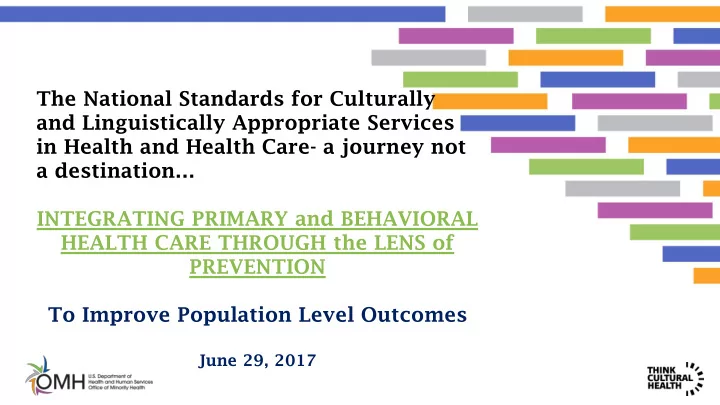

The National Standards for Culturally and Linguistically Appropriate Services in Health and Health Care- a journey not a destination… INTEGRATING PRIMARY and BEHAVIORAL HEALTH CARE THROUGH the LENS of PREVENTION To Improve Population Level Outcomes June 29, 2017
James LaVelle Dickens, DNP, RN, FNP-BC, FAANP CAPT, U.S. Public Health Service (USPHS) Senior Program Manager- OMH Region VI (AR, LA, NM, OK, TX, and 68 Federally Recognized Tribes)
The Delta in Northeast Louisiana
Rabia Balkhi Hospital- Kabul, Afghanistan
Commonwealth of the Northern Mariana Islands
Saipan, Tinian, Rota
Tip of the Spear for Public Health
Providing hope and care…
We’re not in Kansas anymore…
Aerial view-Monrovia Medical Unit (MMU) Ebola Treatment Unit (ETU)
Cultural and linguistic competency is a journey, not a destination – an ever expanding capacity to learn and grow.
Office of the Assistant Secretary for Health Manage 14 core public health offices including: Office of the Surgeon General U.S. Public Health Service Commissioned Corps 10 regional health offices across the nation 10 Presidential and Secretarial Advisory Committees
Overview ‣ The HHS Office of Minority Health Culturally and Linguistically Appropriate Services (CLAS) ‣ The National CLAS Standards ‣ Think Cultural Health ‣
HHS Office of Minority Health Mission: To improve the health of minority populations through ‣ the development of health policies and programs that will help eliminate health disparities.
Culturally and Linguistically Appropriate Services (CLAS) Services that are respectful of and responsive to individual cultural health beliefs and practices, preferred languages, health literacy levels, and communication needs and employed by all members of an organization (regardless of size) at every point of contact.
Social Determinants of Health
Systems Theory
Health
Culture
National Standards for Culturally and Linguistically Appropriate Services in Health and Health Care
Themes of the National CLAS Standards
Intended Impacts of the National CLAS Standards 29
A Resource on the National CLAS Standards A Blueprint for Advancing and Sustaining CLAS Policy and Practice
Principal Standard ‣ Provide effective, equitable, understandable, and respectful quality care and services that are responsive to diverse cultural health beliefs and practices, preferred languages, health literacy, and other communication needs.
Theme 1
Governance, Leadership, and Workforce Advance and sustain organizational governance and ‣ leadership that promotes CLAS and health equity through policy, practices, and allocated resources. Recruit, promote, and support a culturally and linguistically ‣ diverse governance, leadership, and workforce that are responsive to the population in the service area. ‣ Educate and train governance, leadership, and workforce in culturally and linguistically appropriate policies and practices on an ongoing basis.
Theme 2
Communication and Language Assistance ‣ Offer language assistance to individuals who have limited English proficiency and/or other communication needs, at no cost to them, to facilitate timely access to all health care and services. ‣ Inform all individuals of the availability of language assistance services clearly and in their preferred language, verbally and in writing. Ensure the competence of individuals providing language assistance, ‣ recognizing that the use of untrained individuals and/or minors as interpreters should be avoided. Provide easy-to-understand print and multimedia materials and ‣ signage in the languages commonly used by the populations in the service area.
Theme 3
Engagement, Continuous Improvement, and Accountability Establish culturally and linguistically appropriate goals, policies, and ‣ management accountability, and infuse them throughout the organization’s planning and operations. ‣ Conduct ongoing assessments of the organization’s CLAS-related activities and integrate CLAS-related measures into measurement and continuous quality improvement activities. Collect and maintain accurate and reliable demographic data to monitor ‣ and evaluate the impact of CLAS on health equity and outcomes and to inform service delivery. Conduct regular assessments of community health assets and needs and ‣ use the results to plan and implement services that respond to the cultural and linguistic diversity of populations in the service area.
Engagement, Continuous Improvement, and Accountability Partner with the community to design, implement, and ‣ evaluate policies, practices, and services to ensure cultural and linguistic appropriateness. Create conflict and grievance resolution processes that are ‣ culturally and linguistically appropriate to identify, prevent, and resolve conflicts or complaints. ‣ Communicate the organization’s progress in implementing and sustaining CLAS to all stakeholders, constituents, and the general public.
Think Cultural Health National CLAS Standards ▸ ▸ E-learning programs Communication Guide ▸ Tracking CLAS map ▸ CLAS Library ▸ Quarterly e-newsletter ▸
E-learning Programs Communication Guide ▸ Disaster and Emergency ▸ Personnel* Nurses, Social Workers* ▸ Oral Health Professionals* ▸ Physicians, Physician ▸ Assistants, Nurse Practitioners* ▸ Promotores de Salud & Community Health Workers *Accredited
Tracking CLAS Map Tracks efforts to promote or implement CLAS, including: State legislation pertaining ▸ to CLAS training for health professionals State-sponsored activities ▸ for implementing the National CLAS Standards
Resource Library Hundreds of CLAS-related online resources, from reports to videos to toolkits.
Advancing health equity at every point of contact www.ThinkCulturalHealth.hhs.gov
Contact information James LaVelle Dickens, DNP, RN, FNP-BC, FAANP CAPT, U.S. Public Health Service (USPHS) Senior Program Manager-OMH Region VI (AR, LA, NM, OK, TX, and 68 Federally Recognized Tribes) Office of the Assistant Secretary for Health U.S. Department of Health and Human Services 1301 Young Street, Suite 1124 Dallas, TX 75202 (O)214-767-3882 Email: james.dickens@hhs.gov "Leadership isn't about being in charge, leadership is about taking care of those in your charge" Simon Sinek
In Conclusion I’m Dr. James LaVelle Dickens Nurse Practitioner, and I approved this message!!
References: www.ThinkCulturalHealth.hhs.gov AdvancingCLAS@ThinkCulturalHealth.hhs.gov
Questions
Recommend
More recommend